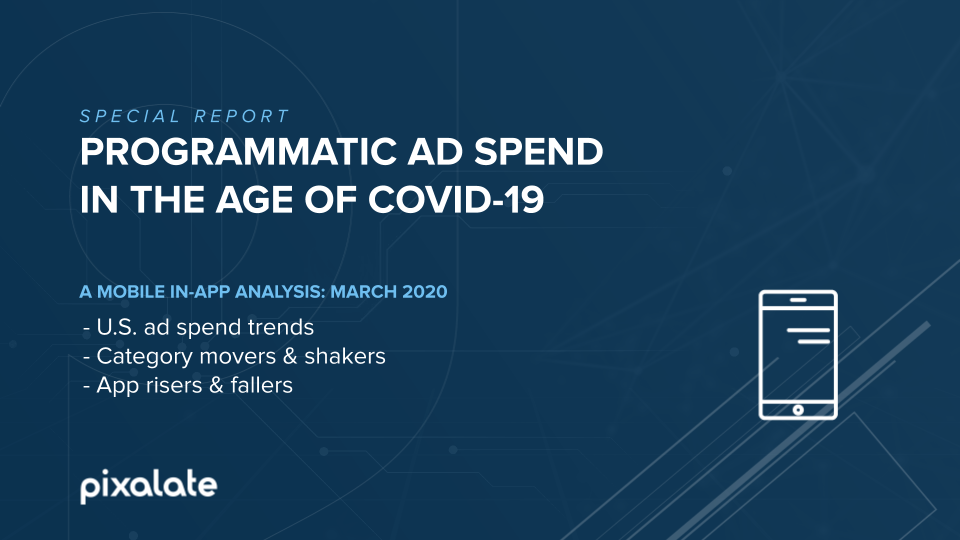
ESPN, NBA apps among those hit hardest, while local news and social apps see an increase
PALO ALTO, Calif., April 15, 2020 — Pixalate, a global ad fraud intelligence and marketing compliance platform, today announced the release of its latest report, Programmatic Ad Spend in the Age of COVID-19: Mobile App Advertising, an analysis of how U.S. programmatic advertisers reallocated investments in March 2020 in response to the crisis.
Key Findings: Programmatic mobile in-app ad spend drops 14% in March 2020
These key statistics are based on Pixalate’s research comparing the first full week of March (March 1-7) to the last full week (March 22-28).
The report reveals which apps gained or lost the most ad spend (ad transactions) in March 2020, according to Pixalate’s research. Below are some examples of fast-rising and decreasing apps:
What’s inside the report
Pixalate’s Programmatic Ad Spend in the Age of COVID-19: Mobile App Advertising report includes:
“Despite the fact consumers are spending more time with media than ever before, our research reveals that advertising demand is not in lockstep with the influx of supply,” said Jalal Nasir, CEO of Pixalate. “However, while overall mobile in-app ad spend fell last month, certain apps and app categories saw significant growth as advertisers altered their media plans.”
Download a free copy of the Programmatic Ad Spend in the Age of COVID-19: Mobile App Advertising report today.
Follow Pixalate
About Pixalate
Pixalate, a global ad fraud intelligence and marketing compliance platform, works with brands and platforms to prevent invalid traffic and improve ad inventory quality. We offer the only system of coordinated solutions across display, app, video, and OTT/CTV for better detection and elimination of ad fraud. Pixalate is an MRC-accredited service for the detection and filtration of sophisticated invalid traffic (SIVT) across desktop and mobile web, mobile in-app, and OTT/CTV advertising. www.pixalate.com
Disclaimer
The content of this press release, and the Programmatic Ad Spend in the Age of COVID-19: Mobile App Advertising report (the “Report”), reflect Pixalate's opinions with respect to the factors that Pixalate believes can be useful to the digital media industry. Any proprietary data shared is grounded in Pixalate's proprietary technology and analytics, which Pixalate is continuously evaluating and updating. As cited in the Report and referenced in the Report’s key findings reproduced herein, programmatic ad transactions, as measured by Pixalate, are used as a proxy for ad spend. The Report examines U.S. advertising activity. Any references to outside sources in the Report and herein should not be construed as endorsements. Pixalate's opinions are just that, opinions, which means that they are neither facts nor guarantees.
MEDIA CONTACT
info@pixalate.com
*By entering your email address and clicking Subscribe, you are agreeing to our Terms of Use and Privacy Policy.
These Stories on Mobile
*By entering your email address and clicking Subscribe, you are agreeing to our Terms of Use and Privacy Policy.

Disclaimer: The content of this page reflects Pixalate’s opinions with respect to the factors that Pixalate believes can be useful to the digital media industry. Any proprietary data shared is grounded in Pixalate’s proprietary technology and analytics, which Pixalate is continuously evaluating and updating. Any references to outside sources should not be construed as endorsements. Pixalate’s opinions are just that - opinion, not facts or guarantees.
Per the MRC, “'Fraud' is not intended to represent fraud as defined in various laws, statutes and ordinances or as conventionally used in U.S. Court or other legal proceedings, but rather a custom definition strictly for advertising measurement purposes. Also per the MRC, “‘Invalid Traffic’ is defined generally as traffic that does not meet certain ad serving quality or completeness criteria, or otherwise does not represent legitimate ad traffic that should be included in measurement counts. Among the reasons why ad traffic may be deemed invalid is it is a result of non-human traffic (spiders, bots, etc.), or activity designed to produce fraudulent traffic.”

